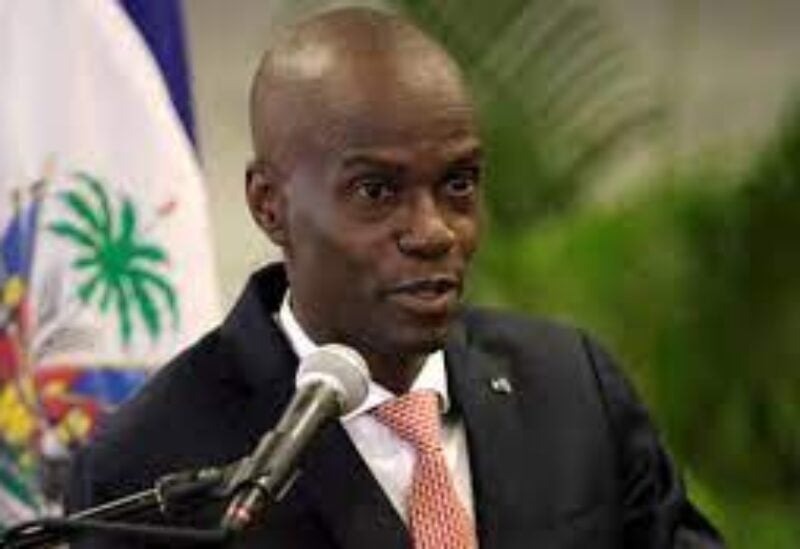
Assassinated Haiti President Jovenel Moise
Authorities confirmed on Thursday that the heavily armed commando force that assassinated Haitian President Jovenel Moise this week included 26 Colombians and two Haitian Americans, as the hunt for the assassins continued.
Moise, 53, was fatally murdered at his home early on Wednesday by a group of foreign, professional killers, further destabilizing the poorest country in the Americas, which is already beset by political divides, poverty, and extensive gang violence.
Initial results revealed that Colombians accused of taking part in the assassination were retired members of his country’s armed forces, according to Colombian Defense Minister Diego Molano, who offered to support the Haitian investigations.
On Wednesday, police tracked the alleged assassins to a house near the killing scene in Petionville, a northern hillside district of Port-au-Prince.
On Thursday, authorities detained a number of individuals after a shootout that lasted late into the night.
Police Chief Leon Charles paraded 17 men before journalists at a news conference late on Thursday, showing a number of Colombian passports, plus assault rifles, machetes, walkie-talkies and materials including bolt cutters and hammers.
“Foreigners came to our country to kill the president,” Charles said, noting there were 26 Colombians and two Haitian Americans.
He revealed that 15 of the Colombians were captured, as were the Haitian Americans. Three of the assailants were killed and eight were still on the run, Charles said.
Jorge Luis Vargas, director of Colombia’s national police, said he had received information requests from Haiti on six suspects, two of whom had apparently been killed in an exchange with Haitian police. The other four were under arrest.
The foreign ministry in Taiwan, which maintains formal diplomatic ties with Haiti, said 11 of the suspects were captured at its embassy after they broke in.
The Haitian-American suspects have been identified as James Solages, 35, and Joseph Vincent, 55, by Haiti’s minister of elections and interparty relations, Mathias Pierre.
Although a State Department spokeswoman could not confirm whether any Americans were held, US officials were in contact with Haitian officials, including investigators, to discuss how the US could help.
Officials in the predominantly French and Creole-speaking Caribbean nation stated on Wednesday that the murderers spoke in English and Spanish.
“It was a fully equipped commando (attack),” Pierre explained, “with more than six automobiles and a lot of equipment.”
Officials have not yet given a motive for the killing. Since taking office in 2017, Moise had faced mass protests against his rule – first over corruption allegations and his management of the economy, then over his increasing grip on power.
An angry crowd gathered on Thursday morning to watch the police operation unfold, with some setting fire to the suspects’ cars and to the house where they had hunkered down. Bullet casings were strewn in the street.
“Burn them!” shouted some of the hundreds of people outside the police station where the suspects were being held.
POWER VACUUM
Although the public had assisted police in locating the perpetrators, Charles urged citizens of the large seaside city of 1 million people not to take matters into their own hands.
On Wednesday, a 15-day state of emergency was announced to aid authorities in apprehending the killers.
Nonetheless, Interim Prime Minister Claude Joseph declared on Thursday that it was time for the economy to recover, and that he had given the airport instructions to reopen.
The death of Moise has raised questions about who is the lawful head of the 11-million-strong republic that shares the island of Hispaniola with the Dominican Republic.
Haiti has struggled to achieve stability since the fall of the Duvalier family dictatorship in 1986, grappling with a series of coups and foreign interventions.
A United Nations peacekeeping mission aimed at restoring order after a coup deposed then-President Jean-Bertrand Aristide in 2004 concluded in 2019, leaving the country in chaos.
“I can imagine a scenario in which there are disagreements about who the military forces and national police are loyal to, in the case of conflicting claims to be the country’s interim president,” said Ryan Berg, a Center for Strategic and International Studies analyst.
Haiti’s 1987 constitution stipulates the head of the Supreme Court should take over. But amendments that are not unanimously recognized state that it be the prime minister, or, in the last year of a president’s mandate – the case with Moise – that parliament should elect a president.
The head of the Supreme Court died last month due to COVID-19 amid a surge in infections in one of the few countries yet to start a vaccination campaign.
There is no sitting parliament as legislative elections scheduled for late 2019 were postponed amid political unrest.
Moise had only recently appointed a new prime minister, Ariel Henry, to succeed Joseph, despite the fact that he had not yet been sworn in when the president was assassinated.
On Wednesday, Joseph looked to assume command of the crisis, leading the government’s response to the assassination, begging for help from Washington, and proclaiming a state of emergency.
Henry, who is seen more favorably by the opposition, told the Haitian publication Le Nouvelliste that Joseph was not the legitimate prime minister and that he should return to his previous function as foreign minister.
“I believe we should speak. Claude was supposed to stay in the government I was going to have, but he didn’t show up “According to a report, Henry said.